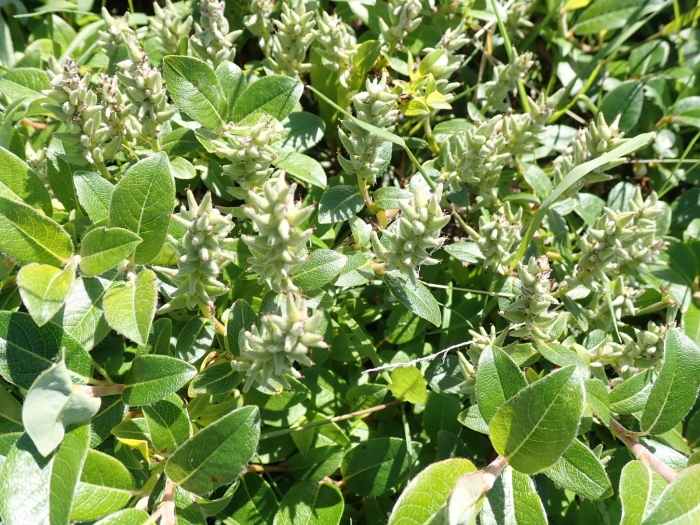Grayleaf Willow
(Salix glauca)
Grayleaf Willow (Salix glauca)
/
/

John Brew
CC BY 4.0
Image By:
John Brew
Recorded By:
Copyright:
CC BY 4.0
Copyright Notice:
Photo by: John Brew | License Type: CC BY 4.0 | License URL: http://creativecommons.org/licenses/by/4.0/ | Rights Holder: John Brew | Publisher: iNaturalist | Date Created: 2018-07-13T11:04:40Z |





























Estimated Native Range
Summary
Salix glauca, commonly known as Grayleaf Willow, is a deciduous shrub or small tree native to a variety of habitats including boreal forests, alpine areas, and tundra across the Russian Far East, North America, Northern Europe, Central Asia, and the Altai Mountains. It typically grows as a shrub up to 1.2 meters (3.9 feet) tall but can reach tree-like stature of up to 6 meters (20 feet) in favorable conditions. The plant features smooth gray bark that becomes deeply furrowed as it matures. The foliage consists of elongated, silvery-gray leaves that contribute to its common name. Grayleaf Willow is dioecious, with male and female flowers appearing on separate plants. The flowers are catkins, which are not particularly showy but are of ecological importance for pollinators.
Grayleaf Willow is valued for its ability to thrive in cold, harsh environments and its adaptability to wet conditions, making it suitable for riparian plantings and restoration projects. It is also used in ornamental gardens for its distinctive foliage and growth habit. This species requires full sun to partial shade and prefers consistently moist soils, tolerating both medium and slow drainage. While it is generally low-maintenance, it can be susceptible to willow beetle infestations and fungal diseases such as willow scab and black canker. Gardeners should be aware that willows can have aggressive root systems, which may cause issues near structures or plumbing.CC BY-SA 4.0
Grayleaf Willow is valued for its ability to thrive in cold, harsh environments and its adaptability to wet conditions, making it suitable for riparian plantings and restoration projects. It is also used in ornamental gardens for its distinctive foliage and growth habit. This species requires full sun to partial shade and prefers consistently moist soils, tolerating both medium and slow drainage. While it is generally low-maintenance, it can be susceptible to willow beetle infestations and fungal diseases such as willow scab and black canker. Gardeners should be aware that willows can have aggressive root systems, which may cause issues near structures or plumbing.CC BY-SA 4.0
Plant Description
- Plant Type: Shrub, Tree
- Height: 6-12 feet
- Width: 4-8 feet
- Growth Rate: Rapid
- Flower Color: N/A
- Flowering Season: Spring
- Leaf Retention: Deciduous
Growth Requirements
- Sun: Full Sun, Part Shade
- Water: High
- Drainage: Medium, Slow
Common Uses
Bank Stabilization, Bee Garden, Bird Garden, Butterfly Garden, Deer Resistant, Erosion Control, Low Maintenance
Natural Habitat
native to a variety of habitats including boreal forests, alpine areas, and tundra across the Russian Far East, North America, Northern Europe, Central Asia, and the Altai Mountains
Other Names
Common Names: White Willow, Arctic Gray Willow, Arctic Grey Willow, Glaucous Willow, Silky Willow, Grey Willow, Grey-Leaved Willow, Smooth Willow, Tunturipaju, Saule Glauque
Scientific Names: , Salix glauca, Salix glauca var. stipulata, Salix glaucops var. villosa,
GBIF Accepted Name: Salix glauca L.